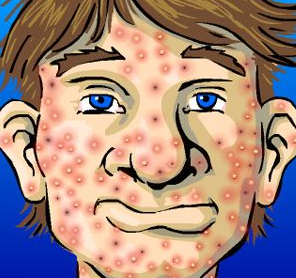Fran Lowry
February 8, 2011 (New Orleans, Louisiana) — Bad news for chocolate lovers who are prone to acne — researchers report that the consumption of pure chocolate can exacerbate facial acne vulgaris within days in people who have a history of the skin disorder.
The finding runs counter to the results of earlier studies that reported no connection between chocolate and acne breakouts, said Samantha Block, a medical student at the University of Miami Miller School of Medicine, in Florida, who spoke here at the American Academy of Dermatology 69th Annual Meeting.
The studies that were fundamental to the notion that diet and acne are not related looked at acne outbreaks after the consumption of chocolate candy, which contains added ingredients such as milk, sugar, and nuts, Ms Block said.
"No studies were found in the literature assessing the effects of pure chocolate, made of 100% cocoa, on acne, so we set out to see what effect pure chocolate might have on acne exacerbation," she said.
The study involved 10 healthy male subjects between 18 and 35 years of age with a history of facial acne vulgaris. The subjects had at least 1 but no more than 4 total facial acneiform lesions (comedones and papules without pustules, nodules, or cysts) at study entry, and were not allowed to use any over-the-counter or prescribed medications.
"We limited our study to males because we didn't want any confounding influences of hormones that women might have around their menstrual cycle affecting our study," Ms. Block explained.
The subjects consumed 6 ounces of 100% Ghirardelli chocolate, which they washed down with a glass of water. They were instructed to maintain their usual diet for 1 week.
Lesion counts were assessed at baseline and on days 4 and 7.
The researchers found a statistically significant increase in the mean number of total acneiform lesions (comedones, papules, and pustules) on day 4 (P = .031) and on day 7 (P = .050), compared with baseline. There was also a trend toward increases in the mean number of noninflammatory comedones on days 4 (P = .058) and 7 (P = .067). There were no significant differences in the number of inflammatory lesions (papules and pustules) at any time point.
The study found a strong correlation between the amount of chocolate that was consumed and the amount of acneiform lesions that developed (r = 0.510 on day 4 and 0.608 on day 7).
Subjects also reported headache, nausea, gastrointestinal distress, vomiting, and diarrhea, Ms. Block noted.
"I think these results show that 100% chocolate does exacerbate acne in individuals who are acne prone," she told Medscape Medical News. "We are planning to continue this work and are recruiting patients for a randomized placebo-controlled trial."
She explained the reasons for choosing Ghirardelli chocolate. "We felt that if our subjects were going to eat chocolate, why don't we give them the best? Also, Ghirardelli makes a chocolate bar that is made with 100% pure cocoa. Not all the manufacturers have 100% chocolate."
"There is a possible mechanism here," F.W. (Bill) Danby, MD, a dermatologist in private practice in Manchester, New Hampshire, told Medscape Medical News after the presentation. "There are theobromines in chocolate. I have no idea whether Ghirardelli chocolate has more theobromines than other chocolate, but I get more headaches from Ghirardelli chocolate than I do from Hershey's, so I wonder about that as a mechanism. That should be quantitated and investigated further."
He added that the earlier work that found no link between chocolate consumption and acne was "fuzzy," but everyday evidence would indicate otherwise. "We all have patients who swear that their acne breakout was due to eating chocolate, so this may be a reason," he said.
Jonette Keri, MD, from the University of Miami Miller School of Medicine, told Medscape Medical News that this study adds another piece to the puzzle of what causes acne to flare up.
"We're getting closer and closer to figuring out how diet affects acne. I love this study because it's adding a piece to that puzzle, so I think it's important. I'm pleased that they are going to continue with a randomized trial," Dr. Keri, who moderated the session, said. She was not part of the study.
Ms. Block, Dr. Danby, and Dr. Keri have disclosed no relevant financial relationships.
American Academy of Dermatology (AAD) 69th Annual Meeting: Abstract 305. Presented February 6, 2011.





Tidak ada komentar:
Posting Komentar